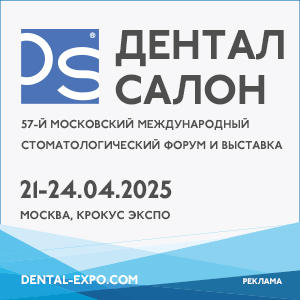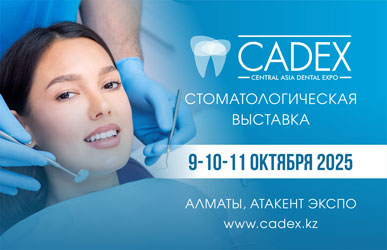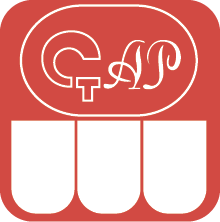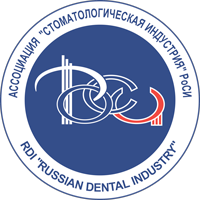DOI:
10.37988/1811-153X_2021_1_22Etiopathogenetic aspects of the occurrence of dental discolouration
Downloads
Abstract
The actual problem of modern aesthetic dentistry is the treatment of teeth discolored. In most cases, discoloration of teeth has a polylogical origin, which provides a rationale for a deeper study of not only the etiology, but also the pathogenesis of the formation of discoloration of the hard tissues of the teeth. Increasingly, the attention of doctors is attracted by minimally invasive methods of treating this pathology, however, the approach to the treatment of various types of discoloration should be comprehensive, taking into account the etiopathogenetic mechanisms of development to ensure not only an aesthetic, but also a functional result. The significance of the etiology and pathogenesis of the development of changes in the color of hard tissues of teeth will make the diagnosis more accurate, and also simplify the choice of treatment tactics in a particular clinical situation.Key words:
tooth discoloration, etiology, pathogenesisFor Citation
[1]
Magsumova O.A., Tkach T.M., Postnikov M.A., Ryskina E.A., Korchagina M.S., Dudina S.E., Polkanova V.A., Odnoletkova I.I. Etiopathogenetic aspects of the occurrence of dental discolouration. Clinical Dentistry (Russia). 2021; 1 (97): 22—29. DOI: 10.37988/1811-153X_2021_1_22
References
- Mashko O.A. Aesthetic considerations in prosthetic dentistry. — Scientific Review. Medical sciences. — 2017; 4: 54—7 (In Russ.).
- Titova O. Age aspects of treatment of teeth discoloritis. — Actual problems in dentistry. — 2019; 4: 61—5 (In Russ.).
- Titova O., Reshetnikova Y., Trunin D. Study of the stability of covering of tooth enamel with decorative lacquer with diseases of teeth. — Actual problems in dentistry. — 2018; 2: 52—5 (In Russ.).
- Spagreeva V.V. The factors, that determine the color of the crowns of the teeth. — Scientific Review. Medical sciences. — 2017; 4: 110—3 (In Russ.).
- Lavrinenko V.I., Botashev F.Kh. Analysis of tooth color in different national groups. — Scientific research. — 2017; 5: 71—2 (In Russ.).
- Kim M., Kim B., Park B., Lee M., Won Y., Kim C.-Y., Lee S. A digital shade-matching device for dental color determination using the support vector machine algorithm. — Sensors (Basel). — 2018; 18 (9): 3051. PMID: 30213046
- Ragain J.C. A review of color science in dentistry: Shade matching in the contemporary dental practice. — Journal of Dentistry, Oral Disorders & Therapy. — 2016; 4(2): 1—5. DOI: 10.15226/jdodt.2016.00156
- Magsumova O.A., Ryskina E.A., Postnikov M.A., Tkach T.M., Polkanova V.A. Changes in the hard tissue sensitivity of the teeth after office teeth whitening procedure. — The dental institute. — 2020; 3 (88): 62—3 (In Russ.).
- Krikheli N.I., Yukhananova B.V. The experience with the application of the microabrasion technique for the treatment of dental fluorosis. — Russian Stomatology. — 2016; 3: 14—6 (In Russ.).
- Ragain J.C. A review of color science in dentistry: Colorimetry and color space. — Journal of Dentistry, Oral Disorders & Therapy. — 2016; 4 (1): 1—5.DOI:10.15226/jdodt.2016.00148.
- Grigoryan M.M., Korotkaya A.R. Causes of teeth discoloration and methods of its treatment by bleaching. — Modern trends in the development of science and technology. — 2017; 2—4: 34—5 (In Russ.).
- Dudnikova M.O. Modern aspects of teeth discoloration etiology. — Molodiy vcheniy. — 2015; 6—3: 64—6 (In Russ.).
- Evteev S.S., Lebedeva S.N., Kharitonova T.L. Etiological factors of teeth discoloration. — Bulletin of Medical Internet Conferences. — 2017; 9: 1446—9 (In Russ.).
- Krikheli N.I. At-home teeth bleaching. Modern approaches. — Russian Stomatology. — 2011; 4 (1): 45—64 (In Russ.).
- Bordina G.E., Lopina N.P., Blinova A.V., Bordin D.A. The discoloring teeth: the chemistry of the emergence and effective whitening. — Russian Stomatology. — 2018; 3: 124—8 (In Russ.).
- Pryadeznikova N.A., Medova M.R., Kolodeznikova N.A. Analysis of the influence of various drinks on the condition of the teeth. — Proceedings of the “Forum of Scientific Youth of Federal Universities”. — Kirov, 2014. — Pp. 820—825 (In Russ.).
- Mamedov F.Yu., Safarov D.A., Aleskerova S.M. Pathogenetic aspects of the effect of smoking on the state of organs and tissues of the oral cavity. — Bulletin of problems of biology and medicine. — 2017; 2: 124—8 (In Russ.).
- Lorenz K., Brun G., Heumann S., Netushil L., Brecks M., Gofman T. Effect of two chlorhexidine oral rinses on mucous plaque accumulation, gingivitis and dental discoloration. Randomized blind placebo-controlled study. — Clinical Dentistry (Russia). — 2015; 4 (76): 74—81 (In Russ.).
- Jyothi M., Girish K. et al. Conservative management of discoloured anterior teeth — a case series. — Scholars Journal of Dental Sciences. — 2016; 3(2): 58—62.
- James P., Worthington H.V. et al. Chlorhexidine mouthrinse as an adjunctive treatment for gingival health. — Cochrane Database Syst Rev. — 2017; 3 (3): CD008676. PMID: 28362061
- Raszewski Z., Nowakowska-Toporowska A., et al. Design and characteristics of new experimental chlorhexidine dental gels with anti-staining properties. — Adv Clin Exp Med. — 2019; 28 (7): 885—90. PMID: 30888120
- Yakubova I.I. Classification of pigmented dental plaque. — Digital dentistry. — 2018; 2: 14—20 (In Russ.).
- Poroshina A.V., Markova K.A., Rusanova T.A. Priestley‘s nonspecific bacterial plaque in children. Etiology. Clinic. Treatment. — Youth Innovation Bulletin. — 2015; 1: 121—4 (In Russ.).
- Pöyhönen H., Nurmi M., Peltola V., Alaluusua S., Ruuskanen O., Lähdesmäki T. Dental staining after doxycycline use in children. — J Antimicrob Chemother. — 2017; 72 (10): 2887—90. PMID: 29091225
- Fleischer G.M. Non-invasive prosthetics with lumineers. — Actual problems of the humanities and natural sciences. — 2016; 2—4: 122—30 (In Russ.).
- Kameneva S.V. Clinical and experimental study of the effect of whitening toothpastes on the quality of fillings and restorations made of nanofilled composite material: master's thesis. — St. Petersburg: S.M. Kirov Military Medical Academy, 2017. — 22 p. (In Russ.).
- Baitus N.A., Novak N.V. Clinical and experimental features of intracrown whitening of devital teeth. — Bulletin of Vitebsk State Medical University. — 2020; 5: 94—100 (In Russ.).
- Patel A., Aghababaie S., Parekh S. Hypomineralisation or hypoplasia?. — Br Dent J. — 2019; 227 (8): 683—6. PMID: 31654000
- Tkachenko T.B., Savushkina N.A., Karpova L.S. Acquired malformations of hard dental tissue: molar-incisor-hipomineralisation (review of literature). — The Scientific Notes of the Pavlov University. — 2019; 4: 18—22 (In Russ.).
- da Cunha Coelho A.S.E., Mata P.C.M. et al. Dental hypomineralization treatment: A systematic review. — J Esthet Restor Dent. — 2019; 31 (1): 26—39. PMID: 30284749
- Sabandal M.M.I., Schäfer E. Amelogenesis imperfecta: review of diagnostic findings and treatment concepts. — Odontology. — 2016; 104 (3): 245—56. PMID: 27550338
- Gazhva S.I., Gadaeva M.V. Etiopathogenic mechanisms of dental fluorosis. — Fundamental research. — 2014; 7—1: 181—6 (In Russ.).
- Giovanni T.D., Eliades T., Papageorgiou S.N. Interventions for dental fluorosis: A systematic review. — J Esthet Restor Dent. — 2018; 30 (6): 502—8. PMID: 30194793
- Gu L.S., Wei X., Ling J.Q. [Etiology, diagnosis, prevention and treatment of dental fluorosis]. — Zhonghua Kou Qiang Yi Xue Za Zhi. — 2020; 55 (5): 296—301 (In Chinese). PMID: 32392970
- Shahroom N.S.B., Mani G., Ramakrishnan M. Interventions in management of dental fluorosis, an endemic disease: A systematic review. — J Family Med Prim Care. — 2019; 8 (10): 3108—13. PMID: 31742127
- Meireles S.S., Goettems M.L., Castro K.S., Sampaio F.C., Demarco F.F. Dental fluorosis treatment can improve the individuals' OHRQoL? Results from a randomized clinical trial. — Braz Dent J. — 2018; 29 (2): 109—16. PMID: 29898055
- de Baat C., Zweers P.G.M.A., Loveren C., Vissink A. [Medicaments and oral healthcare 5. Adverse effects of -medications and over-the-counter drugs on teeth]. — Ned Tijdschr Tandheelkd. — 2017; 124 (10): 485—91 (In Dutch). PMID: 29036235
- Taylor G.D. Molar incisor hypomineralisation. — Evid Based Dent. — 2017; 18 (1): 15—6. PMID: 28338027
- Monaca G.L., Pranno N., Vozza I., Annibali S., Polimeni A., Bossù M., Cristalli M.P. Sequelae in permanent teeth after traumatic injuries to primary dentition. — Minerva Stomatol. — 2019; 68 (6): 332—340. PMID: 32052622
- Hujoel P.P., Lingström P. Nutrition, dental caries and periodontal disease: a narrative review. — J Clin Periodontol. — 2017; 44 Suppl 18: S79-S84. PMID: 28266117
- Shakavets N.V. The caries process: modern view on pathogenesis and effect on the pulp. — Medical news. — 2018; 4 (283): 42—5 (In Russ.).
- Lobach O.I., Lapina N.V. Contemporary aspects of etiology and pathogenesis of dental caries (literature review, part I). — Clinical Dentistry (Russia). — 2017; 3 (83): 26—30 (In Russ.).
- Lapina N.V., Lobatch O.I. Contemporary aspects of etiology and pathogenesis of dental caries (literature review). Part II. — Clinical Dentistry (Russia). — 2017; 4 (84): 76—9 (In Russ.).
- Carvalho J.C., Dige I., Machiulskiene V., Qvist V., Bakhshandeh A., Fatturi-Parolo C., Maltz M. Occlusal caries: Biological approach for its diagnosis and management. — Caries Res. — 2016; 50 (6): 527—42. PMID: 27658123
- Gannam C.V., Chin K.L., Gandhi R.P. Caries risk assessment. — Gen Dent. — 2018; 66 (6): 12—7. PMID: 30444701
- Berdieva R.R. Comparative analysis of materials for root canal filling of teeth with chronic periodontitis in reendo treatment. — Vestnik KRSU. — 2018; 9: 94—7 (In Russ.).
- Hendrickson J.E., Delaney M. Hemolytic disease of the fetus and newborn: Modern practice and future investigations. — Transfus Med Rev. — 2016; 30 (4): 159—64. PMID: 27397673
- Fasano R.M. Hemolytic disease of the fetus and newborn in the molecular era. — Semin Fetal Neonatal Med. — 2016; 21 (1): 28—34. PMID: 26589360
- Burak Zh.M., Butvilovskiy A.V., Yatsuk A.I. Etiology, clinical manifestations and medical tactics for changes in the color of the teeth that occur before their eruption. — Stomatologičeskij žurnal. — 2011; 1: 81—6 (In Russ.).
- Gallagher J.A., Dillon J.P., Sireau N., Timmis O., Ranganath L.R. Alkaptonuria: An example of a «fundamental disease»—A rare disease with important lessons for more common disorders. — Semin Cell Dev Biol. — 2016; 52: 53—7. PMID: 26891864
- Serdiuk A.V., Kovrazhkina E.A., Kulkova A.O. Alcaptonuria patient with vertebrobasilar insufficiency: case report and literature review. — Consilium Medicum. — 2017; 2: 51—5 (In Russ.).
- Erwin A.L., Desnick R.J. Congenital erythropoietic porphyria: Recent advances. — Mol Genet Metab. — 2019; 128 (3): 288—297. PMID: 30685241
Downloads
Received
January 15, 2021
Published on
March 1, 2021












